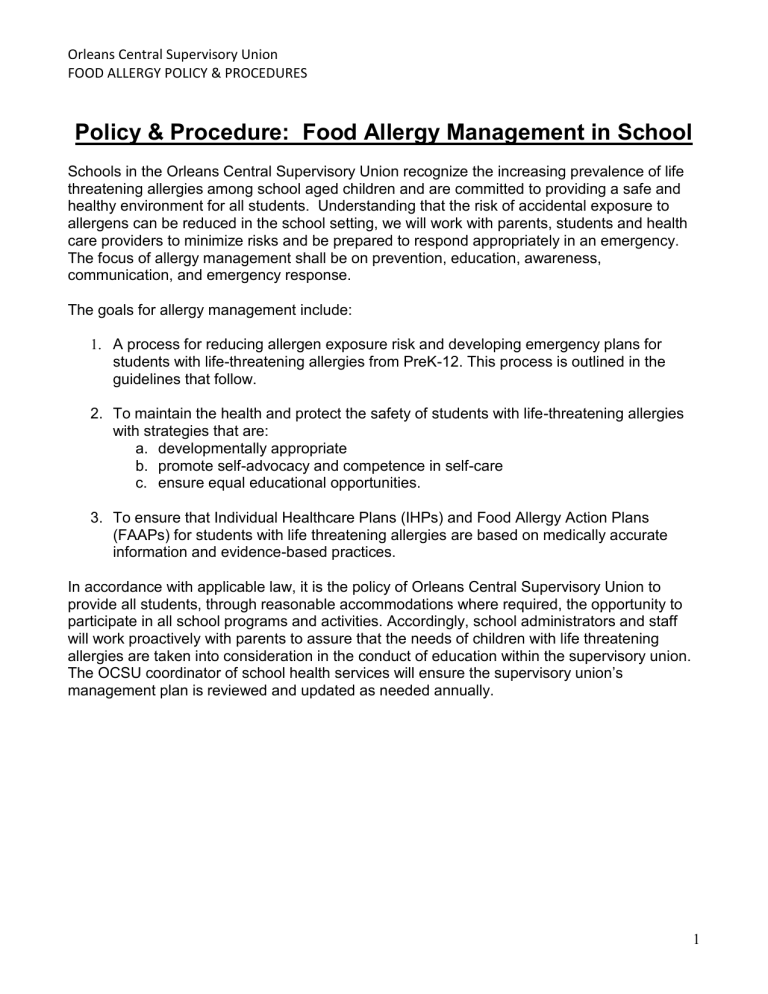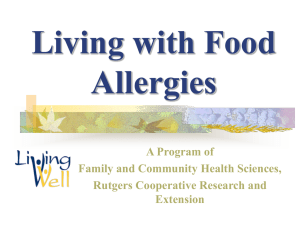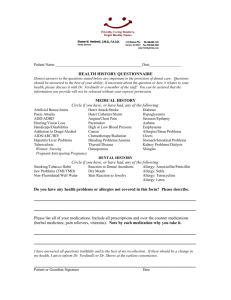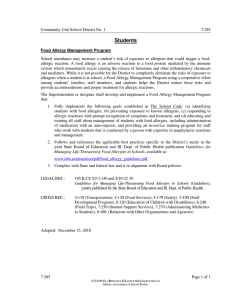
Orleans Central Supervisory Union FOOD ALLERGY POLICY & PROCEDURES Policy & Procedure: Food Allergy Management in School Schools in the Orleans Central Supervisory Union recognize the increasing prevalence of life threatening allergies among school aged children and are committed to providing a safe and healthy environment for all students. Understanding that the risk of accidental exposure to allergens can be reduced in the school setting, we will work with parents, students and health care providers to minimize risks and be prepared to respond appropriately in an emergency. The focus of allergy management shall be on prevention, education, awareness, communication, and emergency response. The goals for allergy management include: 1. A process for reducing allergen exposure risk and developing emergency plans for students with life-threatening allergies from PreK-12. This process is outlined in the guidelines that follow. 2. To maintain the health and protect the safety of students with life-threatening allergies with strategies that are: a. developmentally appropriate b. promote self-advocacy and competence in self-care c. ensure equal educational opportunities. 3. To ensure that Individual Healthcare Plans (IHPs) and Food Allergy Action Plans (FAAPs) for students with life threatening allergies are based on medically accurate information and evidence-based practices. In accordance with applicable law, it is the policy of Orleans Central Supervisory Union to provide all students, through reasonable accommodations where required, the opportunity to participate in all school programs and activities. Accordingly, school administrators and staff will work proactively with parents to assure that the needs of children with life threatening allergies are taken into consideration in the conduct of education within the supervisory union. The OCSU coordinator of school health services will ensure the supervisory union’s management plan is reviewed and updated as needed annually. 1 Orleans Central Supervisory Union FOOD ALLERGY POLICY & PROCEDURES BACKGROUND Food allergy reactions can span a wide range of severity of symptoms. The most severe and potentially life threatening reaction is anaphylaxis. This protocol is to be used for students who are at risk for anaphylaxis. When a physician assesses that a child’s food allergy will result in anaphylaxis, the child’s condition meets the definition of “disability” and may be covered under the Federal Americans with Disability Act (ADA), Section 504 of the Rehabilitation Act of 1973, if the allergy management affects the student’s ability to access education. Anaphylaxis refers to a collection of symptoms affecting multiple systems in the body, the most dangerous of which include a compromised respiratory system and shock. Foods that most commonly cause anaphylaxis include, but are not limited to, peanuts, tree nuts, shellfish, milk, wheat, soy, fish, and eggs. These severe allergic reactions can occur within minutes of ingestion/exposure or can be delayed for up to two hours. Some reactions are “biphasic” in nature with an initial period of symptoms, a symptom free period of 2-3 hours followed by severe shock-like symptoms. At present the only treatments for severe food allergies are: Strict avoidance to prevent reactions Emergency administration of epinephrine and/or diphenhydramine in the event of exposure, followed by initiation of the EMS response system. Exposure may occur by ingestion, inhalation, or dermal contact MEDICATIONS The most commonly prescribed medications for the treatment of anaphylaxis are: diphenhydramine (brand name Benadryl), an antihistamine, which comes in many oral forms: tablets, liquids, liquid-gel capsules, and rapid-dissolve strips *epinephrine (brand name EpiPen, EpiPen Jr, and Twinject auto injectors), a form of adrenalin, in doses of 0.15mg for those 33-65 lbs. and 0.3mg for those > 66 lbs. to be injected intramuscularly. Note: EpiPen is a single dose auto-injector which can be packaged singly or doubly to provide one or two doses respectively. Twinject contains two doses of epinephrine, the first dose in an auto-injector and the second dose in the form of a traditional injection by syringe. Orleans Central Supervisory Union recommends against the use of the Twinject in the school setting as the second dose (syringe) is an inappropriate design for use by unlicensed personnel. *Current (Nov 2010) guidelines from the National Institute of Health recommend epinephrine administration immediately, but many health care providers still order the administration of diphenhydramine first. 2 Orleans Central Supervisory Union FOOD ALLERGY POLICY & PROCEDURES CARE PLAN CONSIDERATIONS/OPTIONS 1. An Individual Healthcare Plan (IHP) is developed by the school nurse, student, parents, and other school personnel to identify a student’s individual nursing needs and specific strategies to meet those needs. 2. A Food Allergy Action Plan (FAAP) is developed by the school nurse, and physician/healthcare provider with input from parents, student, and/or other school personnel to outline emergency steps to be implemented in the event of exposure or possible exposure to the food allergen. See sample at the end of this document. 3. Section 504 Plan- The intent of Section 504 of the Rehabilitation Act of 1973 is to provide students with disabilities equal access to educational programs, services, and activities. Students with disabilities may not be denied participation in school programs and activities solely on the basis of disability. Whether students with life-threatening food allergies are identified under Section 504 as disabled individuals or not, schools within the Orleans Central Supervisory Union will provide those students with IHPs and FAAPs to address their health and safety needs. SPECIFIC RESPONSIBILITIES: Parent/Guardian 1. Inform the school nurse of your child’s allergies before the student begins attending (or as soon as possible after diagnosis). All severe food allergies must be verified by the student’s physician/healthcare provider. 2. Provide your child with a medical alert bracelet/necklace. 3. Teach your child to: Recognize the first symptoms of a food allergy/anaphylactic reaction. Wash hands before and after handling food. Communicate the appearance of anaphylaxis symptoms ASAP to the school nurse, teacher or other trusted adult Carry his/her epinephrine auto-injector (EPIPEN), if appropriate to age, maturity level, and situation. Self-administer epinephrine auto-injector. Not share snacks, lunches, drinks or utensils. Report teasing and/or bullying that relates to the allergy to a trusted adult. Read food labels for ingredients. Know of allergy-safe zones and behaviors. 4. Work with the school to develop plans (IHP, FAAP, 504) to provide accommodations and an appropriate emergency response in the classroom, cafeteria, and at school sponsored activities. 5. Complete (including obtaining physician input) and submit all required medication, medical release, and FAAP forms. 3 Orleans Central Supervisory Union FOOD ALLERGY POLICY & PROCEDURES 6. Inform the school of changes in your child’s food allergy status, your home, work and cell phone numbers, medical information and emergency contact information. 7. Provide emergency medication and replace when it becomes out-of date. 8. Chaperone your child’s field trips when possible/requested. 9. Provide “reserve safe snacks” to be kept in your child’s classroom so there is always something your child can choose from during an unplanned special event. Student 1. Ask the school nurse, your teacher, or another trusted adult in the school to help you if problems arise relating to your food allergy. 2. Use proper hand washing (soap, water, friction) before and after eating and throughout the school day. 3. Do not share or trade foods or eating utensils with others. Use strategies to avoid food allergens. 4. Do not eat anything with unknown ingredients. 5. Communicate about your food allergy with others 6. Tell an adult immediately, if you eat or are exposed to (inhaled, or touched) the food allergen. 7. Tell an adult immediately if you are being bullied or harassed about your food allergy. 8. Make sure you always have access to your emergency medication, whether it is in the nurse’s office, your classroom, your coach has it; you are carrying it, etc. 9. Work towards greater responsibility and independence in managing your food allergy including self-administration of your emergency medication. 10. Demonstrate maturity and responsibility when carrying your emergency medication. 11. Be aware of your environment and how it relates to your allergy. 12. Know and understand your responsibilities with regard to your food allergy and safety. School Administration 1. Ensure that all applicable federal laws (including ADA, Section 504, FERPA, and HIPAA), all state laws and district policies/guidelines that apply are followed. 2. Ensure that plans (IHP, FAAP and/or 504) are developed to provide a safe learning environment for each student with life threatening allergies. 3. Ensure that the above plans are implemented 4. Ensure staff training and education for appropriate staff which includes: reducing life-threatening allergy risks recognizing food allergy symptoms emergency procedures and location of emergency medications 5. Respond immediately to reports of students being teased or bullied about their food allergies. School Nurse 1. Work with parents, school staff, and student’s physician/health care provider to develop and implement appropriate IHP, FAAP and/or 504 plan(s). 2. Maintain up-to-date emergency medications 4 Orleans Central Supervisory Union FOOD ALLERGY POLICY & PROCEDURES 3. Act as liaison between the school and student’s physician/health care provider regarding the IHP, FAAP and 504 plans. 4. Maintain and update the IHP and FAAP. Communicate any changes to staff ASAP. 5. Provide information and training to school staff regarding the IHP, FAAP, and emergency medication administration as appropriate. 6. Provide necessary information, training and medications as needed for field trips. 7. Respond immediately to reports of students being teased or bullied about their food allergies Teachers 1. Participate in the development and implementation of the student’s IHP, FAAP and/or 504 plans. 2. Consider the ramifications of any food use (curriculum, projects or celebrations) within your classroom. 3. Know the signs and symptoms of anaphylaxis (life-threatening allergic reaction) as provided in the student’s IHP. 4. Implement the activities and accommodations cited in the students’ IHP and/or 504 plans, and be prepared to implement the FAAP if needed. 5. Become proficient in emergency medication administration. 6. Communicate with your students and their parents for their cooperation in providing a safe classroom environment. 7. Reinforce appropriate classroom hygiene practices/hand washing before and after eating, and no sharing of food or utensils. 8. Respond immediately to reports of students being teased or bullied about their food allergies. 9. Notify the parents and school nurse in advance of any field trips or other situations that might impact a student’s IHP, FAAP and/or 504 plan(s). Food Service 1. Know all foods/ingredients utilized in the kitchen. 2. Know signs & symptoms of anaphylaxis and emergency protocols related to food allergies. 3. Employ strategies and practices to avoid cross contamination of foods: Allergen-free prep areas in the kitchen Allergen-free tables in the cafeteria Frequent and careful hand washing 4. Use non-latex gloves in food preparation and service. 5. Maintain a current list of students with food allergies. 6. Respond appropriately to all concerns related to food allergies. 7. Respond immediately to reports of students being teased or bullied about their food allergies. Custodian Follow current recommendations for the cleaning/maintenance of allergen-free tables and areas. 5 Orleans Central Supervisory Union FOOD ALLERGY POLICY & PROCEDURES Bus Driver/Company 1. Enforce “No Eating or Drinking” policy on the bus. 2. Be knowledgeable regarding students’ FAAP plans, and skilled in first aid, CPR and emergency medication administration. 3. Maintain emergency communication devices (e.g., cell phones, two-way radios, etc.) on busses. 4. Respond immediately to reports of students being teased or bullied about their food allergies. OTHER IMPORTANT POINTS After School Activities 1. The IHP and/or FAAP will be available for parents to copy and give to others who assume responsibility for their child. Field Trips 1. Life threatening food allergy exposure risks will be considered in the planning and implementation of field trips. 2. Parents will be invited/encouraged to attend or chaperone. 3. Bag lunches of children with food allergies will be stored separately to minimize cross contamination. 4. Attending staff will ensure that the FAAP and emergency medications are available and followed if needed. 5. Emergency Medical Services (911) will be called in all instances of anaphylaxis. Additional Thoughts 1. Educate, Educate, Educate. Severe food allergy management is an ongoing process that evolves with student needs and staff changes. Food bans do not work because it creates a false sense of security. Today, processed foods contain trace amounts of food items that are not always identified on the food label. 2. Special events/Non-routine days. The greatest risk for a life threatening allergic reaction exists when the normal routine is broken such as classroom parties, field trips, a substitute teacher, or after school events. 3. Be Prepared. Always have the FAAP and emergency medications available and think ahead to prevent possible exposure to a food allergen. 4. Symptoms vary greatly. Call 911 when anaphylactic symptoms occur or if ingestion is strongly suspected. Use emergency medication if needed following the FAAP. 5. Be safe, not sorry! Take all complaints from children with food allergies very, very seriously. 6. A child with a life threatening food allergy should NEVER eat food of undetermined ingredients. 7. Cross contamination. It only takes a trace amount of the food protein (allergen) to cause an allergic reaction. Hand washing and thorough cleaning of all possible surfaces (tables, desks, chairs, counters, utensils, dishes, mixing bowls, etc.) where an allergen has been used is absolutely necessary to prevent exposure from cross contamination, 6


